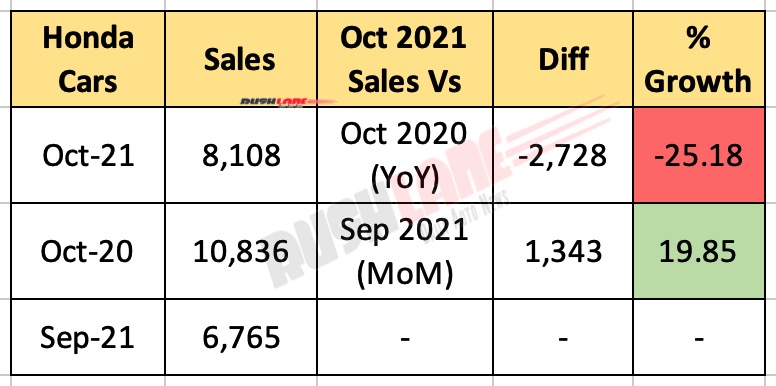
Honda Cars India sales for October 2021 falls by a quarter – Domestic sales stood a bit over 8.1k
Supplies of components have slightly improved in October compared to last month with channel demand expected to improve further by the end of November, led by Diwali season. Despite expectations of better times ahead once Covid-19 pandemic protocols were eased, reality has been far from easy.
Auto manufacturers have found operations to be negatively affected by a shortage of chips. It’s easy to see companies are struggling to achieve production targets. There’s not much that brings relief these days except maybe that sales isn’t lower than current numbers.
Honda Car Sales Oct 2021
Honda Cars India sees sales dip below the 10k mark in October 2021. The only respite being MoM sales has improved. In September 2021 sales fell to below 6.8k units. Sales the following month improved by about 20 percent, up at 8.1k units.
Volume gain stood at 1,343 units. YoY sales decline stood at a quarter at volume loss of 2,728 units. Sales fell from 10,836 units YoY. Last month too sales was reported at a decline. A steeper one at about a third.

Why Honda doesn’t sell a greater number of cars in India is anyone’s guess. But in a discussion it would trickle down to their absence across multiple high volume segments. That, and the current chips crisis that has gripped more than many. The festive season in India has often brought cheer to manufacturers but this year sales is dampened.
Chips Shortage
Chip shortage continues to function as a free falling problem, a sticky situation to deal with. There are fears the problem could dive deep into 2022. With steep demand for these components and a shortage of them, one now has to explore how supplies are met by different manufacturing methods. But with alternatives being a long process to adaptation, the current and present danger remains a shortage that in some quarters is acute.
Lower chips’ supplies has led to price fluctuations for the majority of consumers. Demand is expected to skyrocket in the coming years resulting in a greater need. This chip shortage is likely to further affect the economy as many countries are already struggling with an increased cost of living and inflation rates. Several industries are being affected by this including manufacturing, technology, banking, retail, agriculture and mining.
The global chip shortage has affected production resulting in lower sales, which has led to a delay in deliveries for a number of consumers. There is however no shortage of bookings in many quarters.

